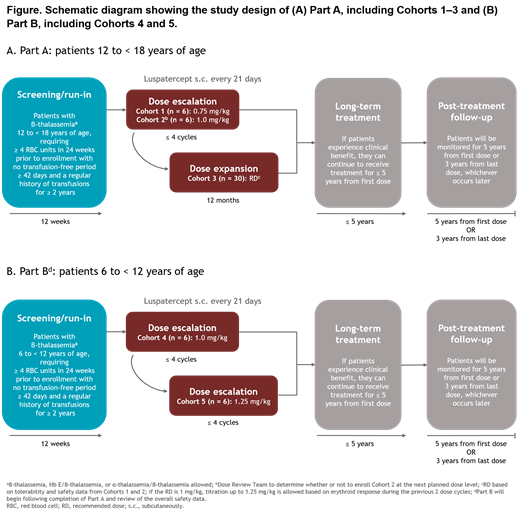Abstract
Background: β-thalassemia is an inherited hemoglobinopathy caused by mutations in the gene encoding the β-globin chain of hemoglobin (Hb), resulting in ineffective erythropoiesis, impaired red blood cell (RBC) maturation, and anemia. Patients (pts) with severe disease require regular, lifelong RBC transfusions and iron chelation therapy (ICT) shortly after diagnosis in early childhood. There is an unmet need for safe and effective treatments for pediatric pts to address the underlying pathophysiology of β-thalassemia and reduce the burden of chronic RBC transfusions early to prevent secondary iron overload and associated morbidity.
Luspatercept is a first-in-class erythroid maturation agent approved in the USA and EU for the treatment of anemia in adult pts with β-thalassemia who require regular RBC transfusions. In previous studies, treatment with luspatercept resulted in clinically significant reductions in RBC transfusion burden in adults with TDT (phase 3 BELIEVE; Cappellini MD, et al. N Engl J Med 2020;382:1219-1231) and increased Hb levels in adults with non-TDT (phase 2 BEYOND study; Taher AT, et al. HemaSphere 2021;5[Suppl 2];Abstract S101).
This phase 2a study (NCT04143724, EudraCT 2019-000208-13) will evaluate the safety and PK of luspatercept in pediatric pts with β-thalassemia who require regular RBC transfusions. The results will determine a recommended dose (RD) for each age group.
Study Design and Methods: Eligible pts will be 6 to < 18 years of age; diagnosed with β-thalassemia, Hb E/β-thalassemia, or α-thalassemia/β-thalassemia; require ≥ 4 RBC units in the 24 weeks prior to enrollment (with no transfusion-free period ≥ 42 days and with a regular history of transfusions for ≥ 2 years); and have Karnofsky (≥ 16 years of age) or Lansky (< 16 years of age) performance status score ≥ 50 at baseline. Exclusion criteria include: a Hb S/β-thalassemia or α-thalassemia diagnosis, chronic anticoagulant therapy ≤ 28 days prior to enrollment, erythropoiesis-stimulating agent or hydroxyurea use ≤ 24 weeks prior to enrollment, ICT initiation ≤ 8 weeks prior to enrollment, use of any investigational drug ≤ 28 days prior to enrollment, or have undergone or are scheduled for transplant or gene therapy.
A total of 54 pts will be enrolled in a staggered study design by age, beginning with a 12-week screening/run-in period. During Part A, pts 12 to < 18 years of age will receive luspatercept at 0.75 mg/kg (n = 6; Cohort 1) or 1.0 mg/kg (n = 6; Cohort 2) subcutaneously (s.c.) once every 21 days for ≤ 4 cycles (Figure A). The RD will be determined for each age group strata at the time of enrollment using descriptive statistics or frequency tabulations between and in aggregate across age-group arms. An expansion cohort (n = 30 pts 12 to < 18 years of age; Cohort 3) will then receive luspatercept for at least 1 year at the RD based on tolerability and safety data from Cohorts 1 and 2; if the RD is 1 mg/kg, titration up to 1.25 mg/kg is allowed in the expansion cohort based on erythroid response during the previous 2 dose cycles.
Part B will be initiated following completion of Part A and review of overall safety data with the Data Monitoring Committee, Scientific Steering Committee, and health authorities. Pts 6 to < 12 years of age will be treated with luspatercept at 1.0 mg/kg (n = 6; Cohort 4) or 1.25 mg/kg (n = 6; Cohort 5) s.c. once every 21 days for ≤ 4 cycles (Figure B).
Any pt who benefits from treatment can continue to receive luspatercept for ≤ 5 years from first dose and will be monitored for 5 years from first dose or 3 years from last dose, whichever occurs later. Pts may receive best supportive care, including RBC transfusions, ICT, antibiotics, antifungal or antiviral therapy, and/or nutritional support, as needed.
The primary objectives are to determine the RD of luspatercept that is safe and tolerable and the PK of luspatercept in pediatric pts with TDT. Key secondary objectives include evaluating mean change in RBC transfusion burden, change in Hb levels, mean change in daily dose of ICT, mean change in serum ferritin, and the immunogenicity and safety of luspatercept in pediatric pts. Safety endpoints include evaluating the type, frequency, seriousness, and severity of adverse events and their relationship to luspatercept treatment. Exploratory endpoints include evaluating exposure-response, health-related quality of life, biomarkers/markers of iron overload and ineffective erythropoiesis, and SARS-CoV-2 serology.
Viprakasit: Bristol Myers Squibb: Research Funding. Coates: Celgene: Consultancy, Honoraria, Research Funding; Forma Pharma: Consultancy; Sangamo: Consultancy; UpToDate: Patents & Royalties; Vifor Pharma: Consultancy; Apo Pharma: Consultancy, Honoraria, Membership on an entity's Board of Directors or advisory committees; Bluebird Bio: Consultancy, Membership on an entity's Board of Directors or advisory committees; Agios: Consultancy, Membership on an entity's Board of Directors or advisory committees; Bristol Myers Squibb: Consultancy, Honoraria, Membership on an entity's Board of Directors or advisory committees; Chiesi: Consultancy, Honoraria, Membership on an entity's Board of Directors or advisory committees; Novartis: Consultancy, Membership on an entity's Board of Directors or advisory committees. Musallam: Celgene, Bristol Myers Squibb: Consultancy; Novartis: Consultancy; Agios Pharmaceuticals: Consultancy; CRISPR Therapeutics: Consultancy; Vifor Pharma: Consultancy. Vienne Buerki: Bristol Myers Squibb: Current Employment. Patturajan: Bristol Myers Squibb: Current Employment, Current equity holder in publicly-traded company. Holot: Bristol Myers Squibb: Current Employment. Aydinok: Novartis: Membership on an entity's Board of Directors or advisory committees, Research Funding, Speakers Bureau; Bristol Myers Squibb/Celgene: Membership on an entity's Board of Directors or advisory committees, Research Funding; Resonance Health: Research Funding; CRISPR Therapeutics: Consultancy; SLN Therapeutics: Consultancy; Imara: Research Funding; Protagonist: Membership on an entity's Board of Directors or advisory committees, Research Funding; Ionis Pharmaceuticals: Research Funding; La Jolla: Membership on an entity's Board of Directors or advisory committees, Research Funding.


This feature is available to Subscribers Only
Sign In or Create an Account Close Modal